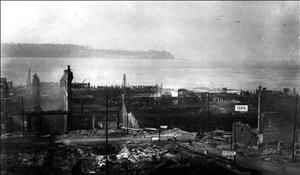Shortly after the Great Fire of June 6, 1889, British writer Rudyard Kipling (1865-1923) visits Seattle. He describes the city as a "horrible black smudge." With wharves destroyed, his steamer must tie up wherever it can, "crashing into the rotten foundations of a boathouse as a pig roots in high grass." He now knows what it means for something to be wiped out.
Kipling on Seattle
Kipling wrote The Jungle Book (1894), Captains Courageous (1897), and Just So Stories for Little Children (1902). In 1907 he received the Nobel Prize in Literature. Kipling arrived in Tacoma on the Northern Pacific Railroad while on a tour of North America. Following is his account of stopping at Seattle while taking a steamer from Tacoma to Vancouver, British Columbia to board the Canadian Pacific Railway for a trip across Canada. The description appears in his book From Sea to Sea and Other Sketches: Letters of Travel. Kipling does not give the date of his trip through Puget Sound, but it is likely that he stopped at Seattle in late June or early July 1889. In the account he mentions lath and string arrangements, which probably refer to building lumber. Kipling's account is as follows;
"I took a steamer up Puget Sound for Vancouver, which is the terminus of the Canadian Pacific Railway. That was a queer voyage. The water, landlocked among a thousand islands, lay still as oil under our bows, and the wake of the screw broke up the unquivering reflections of pines and cliffs a mile away. Twas as though we were trampling on glass. No one, not even the Government, knows the number of islands in the Sound. Even now you can get one almost for the asking; can build a house, raise sheep, catch salmon, and become a king on a small scale.
"Have I told you anything about Seattle, the town that was burned out a few weeks ago when the insurance men at San Francisco took their losses with a grin? In the ghostly twilight, just as the forest fires were beginning to glare from the unthrifty islands, we struck it heavily, for the wharves had all been burned down, and we tied up where we could, crashing into the rotten foundations of a boathouse as a pig roots in high grass. The town was built upon a hill. In the heart of the business quarters there was a horrible black smudge, as though a Hand had come down and rubbed the place smooth. I know now what being wiped out means. The smudge seemed to be about a mile long, and its blackness was relieved by tents in which men were doing business with the wreck of the stock they had saved. There were shouts and counter-shouts from the steamer to the temporary wharf, which was laden with shingles for roofing, chairs, trunks, provision-boxes, and all the lath and string arrangements out of which a western town is made"(From Sea to Sea and Other Sketches: Letters of Travel).

